QuestionQUESTION: Hi Sandra,
I wanted to ask some advice on my pet rat Nimh. She's just over 2 years of age and she has a very, very large lump. I assume it's a tumor. I've had her to the vet and they took a needle sample but the results came back inconclusive. I was given 3 options 1. Have the test done again although it still may be inconclusive. 2. Surgery to remove the lump which is very expensive and her odds of pulling through not very good. 3. Let it be and as long as it's not bothering her don't worry about it. At the time 3 seemed to be the best choice but now the lump has doubled or tripled since then. It is on her hip just over her back right foot. It doesn't seem to be causing her any pain. She's eating and drinking and cleaning herself but lately she is having trouble walking. It looks like the lump is getting in the way of her back foot so that she's walking on it instead of the floor. Other then her mobility she doesn't seem to be having any other negative affects. I guess my question is how big do I let it get? Should I consider having her put down in the near future? I feel selfish for letting it get this big and doing nothing. Any advice or suggestions would be greatly appreciated. Thank you
Michelle.
ANSWER: Hi Michelle
You need to find a vet that will remove it. There is no reason it cant be removed and she can gain her life back. We have done rats that were 3 years old and lived to be close to 4. If the Vet said her odds of pulling through were not very good, is there a reason why that statment was made? Is she sick with other diseases like heart disease or liver problems?
Some vets over charge because they dont like to do it and other vets say its too risky mainly again, because they know deep down that they are not skilled enough to do this fairly easy surgery. I can almost guarantee this vet was not an exotics vet but just a vet that sees rats or other small animals.
She has a classic mammary tumor that can be removed very easy and it should not cost an arm and a leg.
Often, the female rat doesnt usually start to develop mammary tumors until her menopause, around 18 months. As the estrogen levels drop, mammary tumors can develop. It is best to spay the rat to avoid this. The prime time to spay is between 3 and 4 months old. If you spay the rat AFTER tumors have started to form, spaying may not prevent others from growing since the "ball is rolling" so to speak. Tumors can be removed easily by an experienced vet but its best not to wait for them to get too big. This is when they become vascular and start to feed off the rats body, robbing the rat from nutrients needed to keep vital organs healthy. Once the blood supply runs out in the larger tumors, they often become necrotic and pus filled, thus in turn can cause serious infection due to abcess. The tumor can abcess internally, sending poison into the rats blood stream, (sepsis) thus in turn causes death almost within hours. This is one reason its best to get them sooner than later. They often are subcutaneous and "peel" off of her body and require a stitch or two and some surgical glue. Bleeding is very limited as long as the incision is not big. Also, the bigger they are, the more they spread to connecting mammary tissue and will cause others to grow too.
Tumors found on rats are often considered to be malignant but the good news is that they are usually incapsulated, which means that they do not spread since they are contained in a "sac". However, there are times when the Vet will send off some of the tissue samples from the tumor and it is found to be cancerous. If this is true, once the tumor is removed, you can always try TAMOXIFEN, which is a medication used in women for breast tumors. See the article on this page about it for more information.
Lupron has also been used with success in rats on benign tumors. Lupron helps stop production of estrogen in rats, thus in turn, helps to shrink the tumors or halt new growth. The injection is used once per month.
People often ask how big these tumors can get. Below is an example of one very brave little girl who survived this tumor.
Luckily, a very good vet did the surgery, which was very risky due to the high chance of bleeding since the tumor was very vascular and I am sure the rat was pretty frail at this point. The surgery was a success but it should have been done much sooner than it was. There is no excuse to let a tumor get this size.
How long will my rat live with a tumor?
Well thats a hard question to answer. It depends on the fact if the tumor is encapsulated or not. They usually are since they are most often benign. However, even benign tumors eventually cause so many problems for the rat, death will happen regardless. Tumors eventually become vascular and begin to feed off of your rats body, thus resulting in weight loss. With this weight loss comes, of course, lack of proper nutrition and in turn, the rats vital organs are not being supported. Kidneys, lungs, heart, brain....they all begin to be affected as your rat slowly starves, regardless of how much she/he eats. Your rat will become weak as does the immune system. When the immune system starts to become weak, your rat is wide open to serious infection. If the tumor begins to abcess internally, your rat runs a high risk of developing sepsis, thus often resulting in death. None of this is worth putting your tiny friend through. If you do not plan on having the tumor removed, humane euthanasia is the kindest action. I would suggest doing this after your rat has had the tumor for a while though and you start to see your rat lose weight. I wouldnt let the rat become too thin or you know that she has to be miserable. Again though, remember that if you have a Vet that is skilled in surgery on rats and has the proper implements to perform the surgery and will give proper post op treatment etc... tumors do NOT have to be a death sentence. They are successfully removed and they do not always "grow back and they are not always cancerous. Again, most tumors in rats are mammary in nature and are seen among female rats that are not spayed. They are also found in male rats too since they also have mammary tissue, minus the nipple, but they are not seen half as much in males compared to females. I suggest spaying if you plan on having female rats. It will save alot of grief in the long run!
Tumors do not need to be the beginning of the end for your rat. In females, if you spay them early enough you have a big chance of avoiding all of this from ever starting. A skilled vet can easily remove tumors, despite the rats age, and recovery is often fairly easy as long as the vet is skilled at rat care.
If you need me to help find a good vet for you let me know and I will be more than happy to help!!
Hope to hear from you soon!
Sandra
---------- FOLLOW-UP ----------
QUESTION: Hi Sandra,
Thanks so much for the quick reply and advise. The tumor seems to be encapsulated. The vet I saw is not an expert but one who does see rats. I live just outside of St. John's in Newfoundland, Canada and I'm having troble finding a good vet who knows rats. This vet told me that the surgery would be about $700.00 give or take depending on what they found once inside. That seems expensive to me but maybe it isn't. Also she said her odds were not good due to rats being such small animals to be put under for the surgery and the fact that she's over 2 years old. Nimh has no other health problems that I know of. I felt bad not having the surgery but the way the vet explained it seemed to be pay this money and most likely we'd lose her on the table. Any help finding a good, knowledgeable vet here would be great. Thanks again.
Michelle.
AnswerMichelle
That price is the most ridiculous price I have ever heard of. Actually the expensive side would be $300 and that is HIGH. Also, this person should not work on rats if they feel 2 years old is too old for surgery. I see a vet that is scared and lacks confidence that they can do the surgery correct so they are jacking the prices up to keep you from doing it. I wouldnt pay that price and have a high chance the rat will die during surgery and that is what they are hoping you would think too. I know how these people operate. LOL
With the the use of safe anesthesia such as isoflurane or sevoflurane the risks are lowered that there be a problem with putting them under and the skill of the surgeon of course matters which is why you want someone that knows what they are doing!!
I will try to find someone for you...

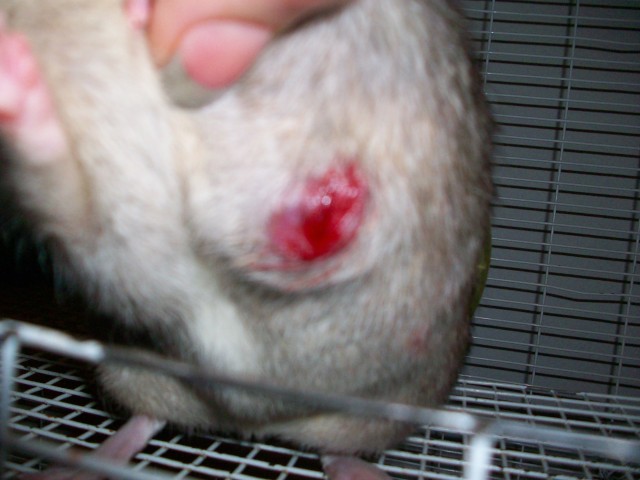 qualified rat vets in my area
QuestionQUESTION: I was reading some of your answers in
qualified rat vets in my area
QuestionQUESTION: I was reading some of your answers in
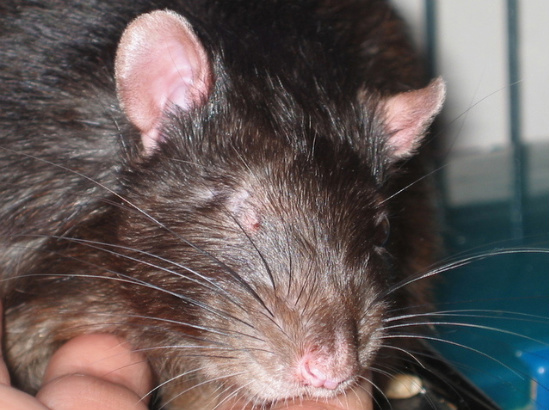 Bleeding eye
QuestionQUESTION: I have a blue male that is about 4 mo
Bleeding eye
QuestionQUESTION: I have a blue male that is about 4 mo
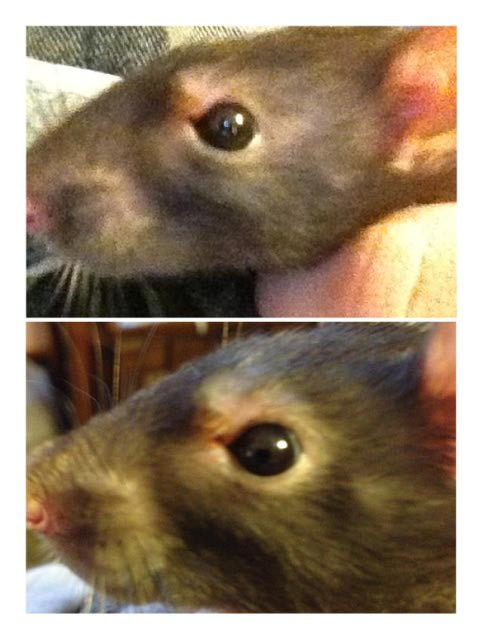 Weird bump
Question
Eye bumb
Hello! Recently Ive noticed a
Weird bump
Question
Eye bumb
Hello! Recently Ive noticed a
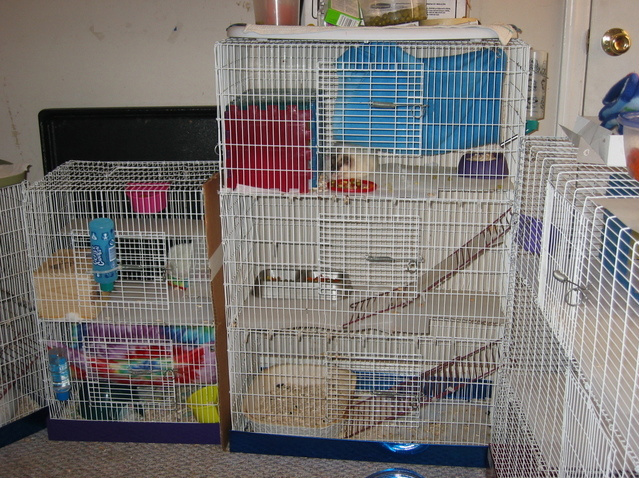 Too many rats...
QuestionQUESTION: Dear Sandra,
Youve helped me before
Too many rats...
QuestionQUESTION: Dear Sandra,
Youve helped me before
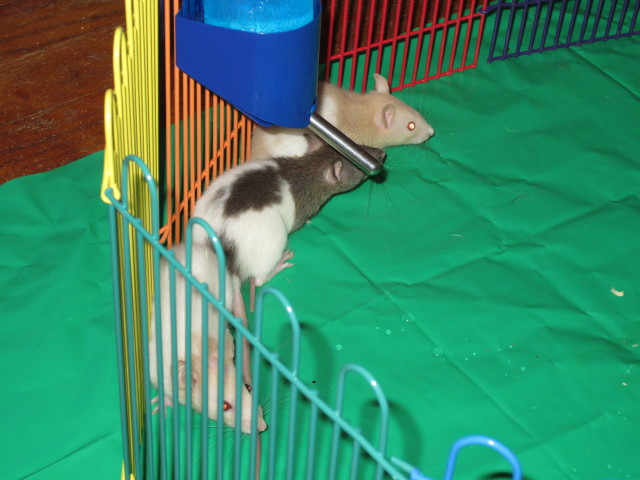 should I but this cage?
QuestionQUESTION: Yesterday I was finally home from sch
should I but this cage?
QuestionQUESTION: Yesterday I was finally home from sch